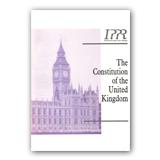Democracy in Britain: Essays in honour of James Cornford
Article
To celebrate the life of James Cornford and his contribution to constitutional reform, IPPR, with support from the Nuffield Foundation, is publishing a collection of essays in his honour. Together, they set out a democratic reform agenda for Britain in the 21st century.
James was responsible for some of the most pioneering and influential work on constitutional and democratic reform in the UK in recent times. As founding director of IPPR, he was the driving force behind The Constitution of the United Kingdom (1991) which provided the blueprint for much of the constitutional change enacted by the New Labour governments.
Edited by Guy Lodge and Glenn Gottfried (IPPR), contributing authors include:
- Stuart White (Oxford University) - What kind of democracy should we want?
- Stuart White and Martin O'Neill (University of York) - 'The New Labour That Wasn't': The lessons of what might have been
- Stuart Wilks-Heeg (University of Liverpool) - Tackling the power gap: A new constitutional reform agenda
- Colin Crouch (University of Warwick) - Dealing with corporate political power
- Mat Lawrence (IPPR) - Democratising the economy
- Jessica Asato (Fabian Society) - Tomorrow's political parties
- Jamie Bartlett (Demos) - Populism, social media and democratic strain
- Sarah Birch (University of Glasgow) - Citizens excluded
- Mark Elliott (Cambridge University) - Law, rights and constitutional politics
- Alan Trench (University of Ulster) - Devolution and the future of the union
- Michael Kenny (Queen Mary University) - The English question: Identity, diversity and nationhood in England
- Ed Cox (IPPR North) - Decentralisation and localism in England
- Vivien Schmidt (Boston University) - Dealing with Europe's other deficit
- Lord Kenneth Macdonald (former director of public prosecutions) - Democratising secrecy: Overseeing security and intelligence
 To mark the publication of Democracy in Britain, IPPR has made available once again The Constitution of the United Kingdom, a landmark document in British constitutional debates and an inspiration and starting point for many of the arguments and ideas put forward in this volume.
To mark the publication of Democracy in Britain, IPPR has made available once again The Constitution of the United Kingdom, a landmark document in British constitutional debates and an inspiration and starting point for many of the arguments and ideas put forward in this volume.
Related items

The full-speed economy: Does running a hotter economy benefit workers?
How a slightly hotter economy might be able to boost future growth.
Making the most of it: Unitarisation, hyperlocal democratic renewal and community empowerment
Local government reorganisation need not result in a weakening of democracy at the local level.
Transport and growth: Reforming transport investment for place-based growth
The ability to deliver transformative public transport is not constrained by a lack of ideas, public support or local ambition. It is constrained by the way decisions are taken at the national level.